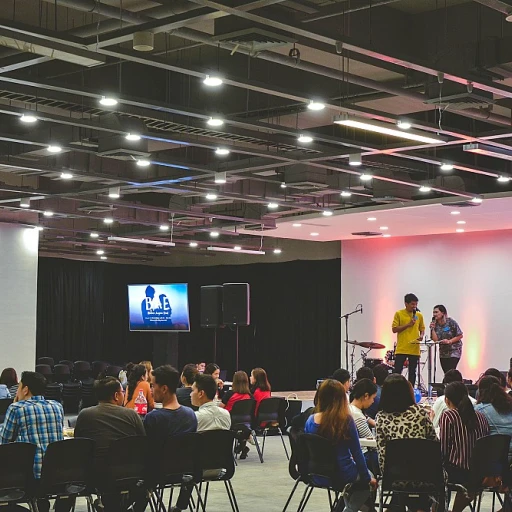
Understanding Workplace Solutions Jobs
A Comprehensive Look into the World of Workplace Solutions
The world of workplace solutions encompasses a broad spectrum of roles and responsibilities that directly impact the efficiency and well-being of an organization's environment. This diverse field often brings together elements of real estate, facilities management, and human resources to craft optimal working environments that meet the ever-evolving needs of both the organization and its employees. As the demand for remote work continues to rise, businesses are reimagining traditional workspaces and looking for qualified professionals to fill key roles such as workplace consultants and facilities managers. These roles are crucial in connecting various pipelines within corporate structures, ensuring smooth day-to-day operations, and enhancing the overall workplace experience. Workplace solutions jobs can range from executive-level positions like Director or Vice President of Facilities to regional management roles and even more specialized tasks performed by consultants or team members. Depending on the structure and location of the organization, you might find opportunities in bustling hubs like San Francisco or roles that are open for remote applicants across the United States. Employee mental health, customer service, and the ability to adapt to policy changes such as cookie and privacy policies are increasingly becoming integral parts of these roles. For those interested in pursuing a career in workplace solutions, it's advantageous to join talent communities or engage in conversations with industry leaders to stay ahead of global trends and best practices. With major companies like Goldman Sachs emphasizing the importance of an integrated corporate workplace, there's never been a better time to dive into these opportunities. Navigating the workflow of real estate and facilities management can be challenging, yet rewarding, for those who are passionate about building collaborative and efficient workspaces. For those considering stepping into this industry, knowing what to expect and how to strategize your career path can be critical. Asking essential questions during an interview is one such strategy to ensure you're prepared to join this dynamic field.The Role of Human Resources Analytics
The Impact of Data on HR Decisions
In the realm of workplace solutions, human resources analytics plays a pivotal role in shaping effective strategies. As companies strive to enhance their workplace environments, the use of data-driven insights becomes crucial. HR analytics helps organizations understand employee behavior, optimize talent management, and improve overall workplace experience.
Enhancing Employee Engagement
One of the primary benefits of HR analytics is its ability to boost employee engagement. By analyzing data related to employee satisfaction, mental health, and productivity, workplace solutions managers can tailor initiatives that foster a positive work environment. This is particularly important in remote jobs, where maintaining team cohesion can be challenging.
Optimizing Facilities Management
Facilities management is another area where HR analytics proves invaluable. By leveraging data, corporate workplace teams can optimize space utilization, reduce costs, and improve the real estate workplace experience. This is essential for regional and global directors looking to streamline operations and enhance customer service.
Strategic Workforce Planning
HR analytics also aids in strategic workforce planning. By analyzing trends and patterns, companies can anticipate future needs and align their talent community accordingly. This proactive approach ensures that organizations are prepared for changes in the job market, whether it involves hiring new team members or promoting from within.
For more insights on how HR analytics can transform workplace solutions, you can explore the Kroger Employee Guide for 2024.
Key Skills for Success
Essential Skills for Advancing in Workplace Solutions
Pursuing a career in workplace solutions necessitates a distinct skill set tailored to the dynamic environment of facility management, real estate, and corporate services. Here’s a closer look at the key abilities that can propel an individual towards success in this field.
- Analytical Skills: As the backbone of human resources analytics, these skills are imperative for providing solutions and insights. Whether analyzing regional management data or evaluating remote work trends, grasping complex datasets will aid in strategic decision-making.
- Communication Abilities: The capability to articulate ideas clearly to team members and communicate effectively with a diverse global workforce, from on-site facilities managers to remote applicants, is vital.
- Problem-Solving Acumen: Daily operations present a variety of challenges. Problem-solving skills are indispensable, particularly for those aiming to join talent communities or climb the ranks to director or vice president positions within estate management.
- Technical Proficiency: Familiarity with workplace management software and platforms, alongside an understanding of cyber security practices such as cookie policies, is essential for modern corporate workplace roles.
- Customer Service Excellence: A customer-focused attitude is pivotal for delivering exceptional workplace experiences to employees and enhancing mental health and wellbeing initiatives.
Integrating these skills can help professionals excel in workplace solutions jobs and open doors to regional and international positions, from the bustling offices of San Francisco to projects managed by global enterprises like Goldman Sachs. Joining talent communities in facilities and real estate can also provide networking opportunities that are essential for career growth. By fostering these competencies, individuals are well-equipped to navigate the evolving landscape of workplace solutions.
Challenges in the Field
Overcoming Challenges in Workplace Solutions
Navigating the landscape of workplace solutions presents numerous challenges that professionals in this field must address to succeed. The complexities of these challenges require a nuanced understanding of both traditional and emerging aspects of workplace management.- Adapting to Remote Work: The global shift towards remote work has transformed how workplace solutions managers operate. Adapting facilities management to accommodate remote jobs while ensuring seamless corporate workplace experiences is vital. This transition comes with the need to maintain connectivity among team members across regional, real estate, and global solutions.
- Balancing Mental Health and Productivity: In today's fast-paced work environment, maintaining a focus on mental health is crucial for both employees and managers. Workplace solutions professionals must integrate wellness programs that balance employee well-being with productivity goals, thus ensuring a supportive real estate workplace atmosphere.
- Ensuring Efficient Customer Service: For workplace consultants and directors, delivering efficient customer service is key to success. This means collaborating with facilities teams to ensure the seamless operation of services and addressing open job demands within the corporate estate environment.
- Compliance with Policies: Adherence to regulations such as cookie policies and privacy policies poses a continuous challenge. Staying updated on legal requirements and aligning workplace solutions strategies ensures compliance and fosters an atmosphere of trust with applicants and existing employees alike.
Career Pathways and Growth
Navigating Career Growth in Workplace Solutions
Pursuing a career in workplace solutions presents a dynamic path with diverse opportunities for growth. This field encompasses various roles such as a facilities manager, workplace consultant, or even a regional director. Understanding the potential career pathways and growth options is crucial for applicants eyeing these opportunities. Workplace solutions professionals often find themselves in multidisciplinary roles engaging with real estate, facilities management, and customer service. For instance, a workplace manager might start by supervising day-to-day operations and progress towards more strategic roles, eventually overseeing regional or global operations. These positions are typically influenced by the scale and needs of the organization. Common Career Progressions Include:- Entry-Level Roles: Positions such as workplace experience coordinator or facilities management associate offer exposure to the basics of workplace management and service delivery.
- Mid-Level Roles: Advancement into managerial positions such as a workplace consultant or estate workplace manager involves greater responsibility and influence over project outcomes and team leadership.
- Senior-Level Roles: High-level positions like vice president of facilities or global director involve strategic development of workplace solutions, often joined by complex problem-solving and long-term planning.













